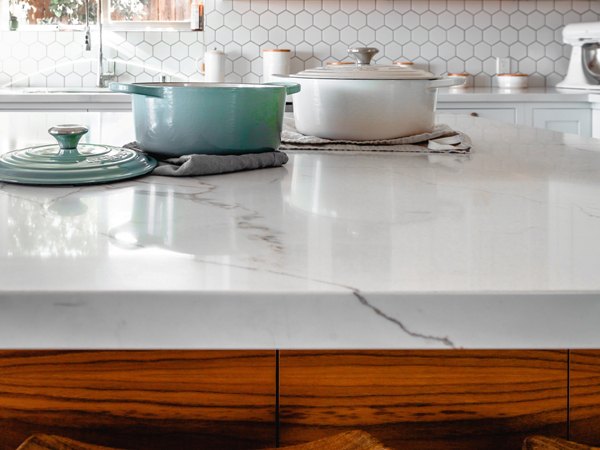When it comes to kitchen countertops, the material you select can have a significant impact on both the aesthetics and functionality of your kitchen. Two broad categories of materials dominate the countertop market: natural stones and man-made products. Each has its own unique characteristics and advantages, making the choice a matter of personal preference, lifestyle, and budget.

Natural Stones
Natural stones have been a popular choice for kitchen countertops for centuries. These stones are sourced from quarries, then cut and polished into slabs suitable for countertop use. They need to be sealed at the beginning and repeated once in a while. Here are some of the most commonly used natural stones for kitchen countertops:
- Granite: Granite is a classic choice known for its durability and natural beauty. It’s resistant to heat and scratches. It is also resistant to stains when it is properly sealed. With a wide range of colors and patterns, granite can complement various kitchen designs.
- Quartzite: Often confused with quartz (a man-made stone), quartzite is a natural stone prized for its strength and striking appearance. It’s heat and scratch-resistant, making it a durable choice for kitchens. It is also resistant to stains when it is properly sealed
- Soapstone: Soapstone is an excellent choice for homeowners seeking a unique, rustic look. It’s relatively soft and prone to staining. It can develop a beautiful patina over time. Regular oiling can help maintain its appearance.
- Marble: Marble exudes elegance and sophistication. It’s beloved for its veined patterns and lustrous finish. However, it is relatively softer and more susceptible to staining than granite, so it may require more maintenance.
| Durability | Scratch Resistance | Heat Resistance | Stain Resistance | |
| Granite | High | Moderate to High | High | High with Proper Sealing |
| Quartzite | High | Moderate to High | High | High with Proper Sealing |
| Soapstone | High | Moderate to High | High | Moderate |
| Marble | Less | Less | Less | Prone to staining |

Man-Made Materials
- Quartz (engineered stone): Engineered quartz countertops are made from a combination of natural quartz crystals and resin. They are non-porous, highly resistant to stains, and also highly resistant to scratches. They are also resistant to heat but they can get damaged from exposure to excess heat or some appliances like slow or pressure cookers . Make sure you use heat protectors like coasters and hot pads under hot pots or any appliances which produce heat.
Quartz countertops offer a wide array of colors and patterns, allowing homeowners to achieve a consistent and uniform look.
- Porcelain: Porcelain countertops are mostly made up china clay with adding some minerals to it. They are highly heat resistant. They are also scratch resistant and stain resistant. Porcelain are gaining popularity for their durability and ease of maintenance.
They can mimic the look of natural stone or other materials.
Porcelain countertops are lightweight and come in a variety of finishes, making them a versatile choice for modern kitchens.
- Solid Surface: Solid surface countertops, like Corian, are made from a blend of acrylic polymers and natural minerals. They are moderate resistant to stains, and they may be vulnerable to heat and scratches. They are seamless and offer design flexibility. These countertops can be easily repaired.
| Durability | Scratch Resistance | Heat Resistance | Stain Resistance | |
| Quartz | Highly durable | High | Can be damaged by high heat | High |
| Porcelain | Durable | High | High | High |
| Solid Surface | Highly durable | Moderate | Can be damaged by high heat | Moderate |
When choosing between natural stone and man-made countertops, consider factors such as your budget, design preferences, and lifestyle. Natural stones offer a timeless and unique appearance, while man-made products provide more control over color and pattern consistency. Additionally, it’s important to think about maintenance requirements and the specific needs of your kitchen.
In the end, the choice between natural and man-made stone countertops comes down to your personal style and practical considerations, ensuring that your kitchen not only looks stunning but also functions efficiently for years to come.
Takeaway: Granite and quartzite are the most common natural stones because of their durability.
Marble and soapstone are used less commonly because they are more prone to staining.
Quartz and porcelain are the most common man-made products which are highly resistant to heat, scratch, and stain
Photo by roam in color on Unsplash

